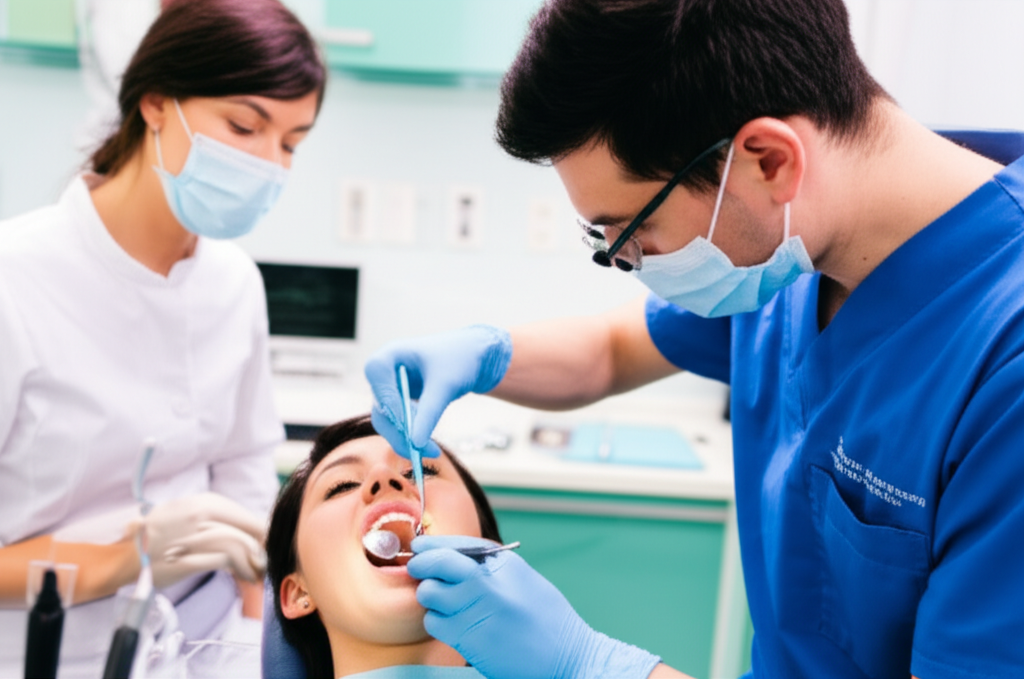
Is a Dentist a Specialist? Understanding General Dentists vs. Dental Specialists
Have you ever sat in the dental chair, looking up at the bright lights, and wondered, “Is my dentist a specialist? And if not, who helps with the tough procedures?” If you’re not sure if your dentist can handle every kind of dental problem or if you need someone with more special training, you’re not alone. This is a common question for many patients. Understanding this is the first step to looking after your dental health.
All dentists have worked hard in school, but not every dentist is called a “specialist.” General dentists are your main dental care providers and handle most of the usual work, but for harder or unusual dental needs, you might see a dental specialist—someone with extra training after dental school. Knowing who does what, and when to see which dentist, can help you get better care and save time and money.
Let’s explain the differences, answer your top questions, and give you the knowledge to know exactly whom to visit for every dental need.
In This Article
- Introduction: The Basics of Dental Care
- What Is a “Dentist”? The General Dentist’s Role
- What Makes a Dentist a “Specialist”? Extra Training and Focus
- The 12 Main Dental Specialties (and What They Do)
- When to Visit a General Dentist vs. a Specialist
- Why See a Dental Specialist?
- How to Make Sure Your Dental Specialist is Qualified
- Conclusion: Both Dentists and Specialists Are Important
Introduction: The Basics of Dental Care
First, all dentists—whether they choose to stay general dentists or become specialists—go through the same first steps. After college, they finish four years of dental school, learning in classes and with real patients.
But here’s the main difference: Not all dentists keep going after dental school to study a special area. You can compare this to medicine. All doctors start with the same degree, but only some do extra training in fields like heart care or skin problems. Dentistry is like this too.
- General dentists are your main point of contact for regular care, check-ups, fillings, and most common dental work.
- Dental specialists do extra schooling (2-6 years more!) to become experts in one type of dental problem.
Let’s see what separates general dentists from specialists, and why both are important.
What Is a “Dentist”? The General Dentist’s Role
You probably visit your general dentist for cleanings, checking on cavities, or getting an X-ray. But what does a general dentist actually do?
Education: DDS/DMD Degrees
All dentists first get either a Doctor of Dental Surgery (DDS) or a Doctor of Medicine in Dentistry (DMD). They both require:
- Four years of college (often in science)
- Four years of dental school, approved by the Commission on Dental Accreditation
- Clinical work with patients
- Passing tests and getting a license in their state or country
This schooling gives dentists a strong base in mouth anatomy, disease, treating problems, and patient care. It’s hard work—like medical school, but for teeth and gums.
What General Dentists Do
Once they’re done with school, general dentists handle a bunch of things, such as:
- Preventive care: Check-ups, cleanings, fluoride, and sealants to keep your mouth healthy and catch issues early.
- Fixing teeth: Fillings, crowns, bridges, and basic root canals for bad or broken teeth. Sometimes they work with special dental labs for harder cases.
- Simple extractions: Pulling teeth that can’t be saved or are in the way for braces.
- Cosmetic dentistry: Whitening, tooth bonding, and sometimes veneers (especially if they do extra courses). For tough work like custom crowns, your dentist might work with a dental ceramics lab.
- Teaching patients: Helping you learn how to care for your teeth at home.
General dentists handle lots of things, but they also know when something may be too tough or tricky for them to handle alone.
Your Main Dental Provider
Your general dentist is your main dental contact, looking after your dental health over the years. They:
- Keep an eye out for changes and catch problems early
- Treat most common dental issues
- Send you to a specialist if you need more advanced care
They’re like your family doctor, always there for most needs, and calling for a specialist if something big pops up.
What Makes a Dentist a “Specialist”? Extra Training and Focus
But what if you need dental care that’s beyond what most general dentists do? That’s when a dental specialist steps in—someone with extra skills for special problems.
Training to Be a Specialist
Specialists spend 2-6 years more in school after finishing dental school. During these years, they:
- Focus just on one area, like root canal treatments or gum disease
- Practice advanced skills on harder cases
- Learn new technology
- Often must pass difficult board tests to prove their skills
Some spots, like oral and maxillofacial surgeons, are so demanding that the dentist may need medical school, too—sometimes another six years!
What Is Specialization in Dentistry?
A dental specialist is someone who only works on a certain set of dental issues, like orthodontists who straighten teeth or periodontists who focus on gums. They bring three big things to the table:
- More knowledge: They know the tough, unusual cases really well.
- Special tools: They have things a general dentist might not.
- Work as a team: Specialists and general dentists work together to make sure treatment runs smoothly.
You often see a specialist only when your general dentist refers you—like getting advice from an expert for special jobs.
The 12 Main Dental Specialties (and What They Do)
The American Dental Association (ADA) accepts 12 different dental specialties (as of 2024). Here’s an easy guide to what each one does:
1. Orthodontics and Dentofacial Orthopedics
- What they do: Straighten teeth and fix bite problems with braces or aligners.
- See them for: Crooked teeth, overbites, underbites, or jaw issues.
2. Endodontics
- What they do: Root canal treatments and care for the inside of teeth (the “nerve” area).
- See them for: Bad tooth pain, deep cavities, or tough root canals.
3. Periodontics
- What they do: Treat gum disease and do gum surgery; place dental implants.
- See them for: Bleeding gums, sore gums, loose teeth, or implants.
4. Oral and Maxillofacial Surgery
- What they do: Remove tough teeth, do jaw or face surgery, treat facial injuries, sometimes place implants.
- See them for: Wisdom teeth, jaw problems, face injuries, or cleft palates.
5. Pediatric Dentistry
- What they do: Dental care for babies, children, and teens—including kids with extra needs.
- See them for: Care just for kids, or help with dental fear.
6. Prosthodontics
- What they do: Replace missing teeth with crowns, bridges, dentures, implants, or full-mouth fixes.
- See them for: Lots of missing teeth or big repairs. They may work with a crown and bridge lab for best results.
7. Oral and Maxillofacial Pathology
- What they do: Find out what diseases affect the mouth, look at tissue samples.
- See them for: Bumps, sores, or possible mouth cancer.
8. Oral and Maxillofacial Radiology
- What they do: Read detailed X-rays, CT scans, and other pictures of teeth and jaws.
- See them for: When you need special imaging.
9. Dental Public Health
- What they do: Work on community health, disease prevention, teaching large groups.
10. Orofacial Pain
- What they do: Help people with long-lasting face or jaw pain, like TMJ issues.
11. Dental Anesthesiology
- What they do: Give strong numbing medicine (anesthesia) to help patients feel comfortable, especially those who are scared or have health problems.
12. Oral Medicine
- What they do: Diagnose and treat tough mouth and jaw problems that don’t need surgery, like infections, autoimmune issues, or side effects from other diseases.
Each specialist is important for handling certain problems, so you get the best care when you need it.
When to Visit a General Dentist vs. a Specialist
Knowing “who does what” is useful, but how do you know whom you should see for your dental problem?
Your General Dentist: For Everyday Needs
Most of the time, your general dentist is where you start and where you go for regular dental care. Go to your general dentist for:
- Check-ups and cleanings: To prevent cavities and gum problems.
- Fillings and simple crowns: For fixing small problems.
- Simple tooth removals: If the tooth isn’t stuck or in a hard spot.
- Simple cosmetic work: Like teeth whitening or bonding.
- Regular health checks: Watching out for signs of problems.
If you need a regular set of dentures, general dentists often work with a removable denture lab for a good fit.
Your Dentist Referring You to a Specialist
Sometimes, your dentist finds a problem that isn’t so simple. They may send you to a specialist for things like:
- Tough root canals: If the roots are tricky, you’ll see an endodontist.
- Serious gum disease: A periodontist can help if treatment gets complicated.
- Children’s dental issues: Pediatric dentists are trained to help kids, especially those with fear or special needs.
- Surgical tooth removals (like wisdom teeth): Oral surgeons are trained for harder, riskier extractions.
- Braces or jaw work: Jaws or teeth that need big changes should be seen by an orthodontist.
- Dental implants: If your case is complex, you might see a prosthodontist and their lab.
Your general dentist knows when it’s better to pass you to a specialist, so you get the safest and best results.
Why See a Dental Specialist?
You might wonder: why not just stick with a general dentist for everything? Here’s why sometimes a specialist is best:
Deeper Knowledge
Specialists aren’t just “better trained”—they do the same kind of work all day, so they’re really good at it. For example, an endodontist handles many more root canals each year than a general dentist.
Better Tools and Newer Techniques
Some specialists use special equipment that most general dentists don’t have, like high-tech microscopes or advanced imaging.
Better Results in Tough Cases
If your dental problem is unique or tricky, a specialist’s focused experience can lower the risk of problems and help things heal faster. For example, for a full new set of teeth, a specialist may work with a digital dental lab for perfect results.
Teamwork
Specialists and general dentists always share information and work together to make sure your care is smooth from start to finish.
How to Make Sure Your Dental Specialist is Qualified
Not everyone calling themselves a “specialist” is really trained for it. Here’s how to be safe:
- ADA-recognized specialty: Only specialties listed by the American Dental Association (ADA) are officially accepted.
- Board certification: Some specialists pass extra tough tests for extra proof of their skills, though this is usually not required.
- Proper license: Your specialist should have a license that is current where you live.
- Referral from your own dentist: Your regular dentist can tell you who in your area is good.
- Belonging to a professional group: Groups like the American Association of Orthodontists or American College of Prosthodontists are a good sign.
- Proof of special training: Ask where they trained—a good specialist will be happy to tell you.
Dental care is important—don’t be afraid to ask for proof or look in the ADA’s specialty directory.
Conclusion: Both Dentists and Specialists Are Important
Here’s what to remember:
- Not all dentists are specialists. All dentists finish dental school, but only about 1 in 5 do more years of extra specialty training.
- General dentists handle most daily care, from cleanings to small repairs.
- Dental specialists step in for advanced, special, or tough problems—they have more focused knowledge and tools.
- Teamwork is common. Dentists and specialists work together to help you get the best results.
- It’s smart to ask questions. Don’t be shy—ask your dentist about their training, what they do, and when you should see a specialist.
- Regular dental visits save money, time, and keep teeth healthier.
Your Action Steps: Be in Charge of Your Dental Health
- Keep up with check-ups at your general dentist—even if your teeth feel fine.
- If you’re sent to a specialist, ask why, what they do, and what will happen.
- Check your dental insurance to see what’s covered for specialty care.
- For big procedures, it’s okay to get a second opinion if you feel unsure.
- Talk openly with your dentist and any specialists. Working together leads to the best results.
When you understand the roles in dentistry, you’re ready to choose the right care, feel less nervous, and protect your smile for years.
Frequently Asked Questions
Is a general dentist less skilled than a specialist?
No—general dentists are experts in everyday dental health and most common treatments. Specialists are trained mainly for hard or rare cases.
Does insurance pay for seeing a specialist?
It depends. Some insurance covers specialists if your dentist refers you, but some don’t. Ask your insurance before you start.
Can my dentist do implants or root canals?
Many general dentists do simple root canals or implants. If your case is tough, they will send you to a specialist, like an endodontist or prosthodontist.
How do I know if my dentist is a specialist?
Ask about their extra schooling, certifications, and if they’re recognized by the ADA in a specialty.
Who should I see for cosmetic dental work?
General dentists do basic cosmetic work. For things like porcelain veneers or full smile changes, a specialist (like a prosthodontist) may step in—and your dentist might work with a veneer lab for best results.
The Key Takeaway
Your dentist, whether a generalist or specialist, is your teammate in keeping your mouth healthy. Knowing the difference means you can make better choices, from simple cleanings to more serious dental work.
If you’re sent to a specialist, it’s not a sign something is terribly wrong—just that you’re getting the help you need.
A healthy, confident smile is possible—and now you know who can help you at each step.
Medically reviewed and checked by trained dental professionals. For the best advice or to find a dental specialist near you, ask your general dentist or go to trusted groups like the American Dental Association.








